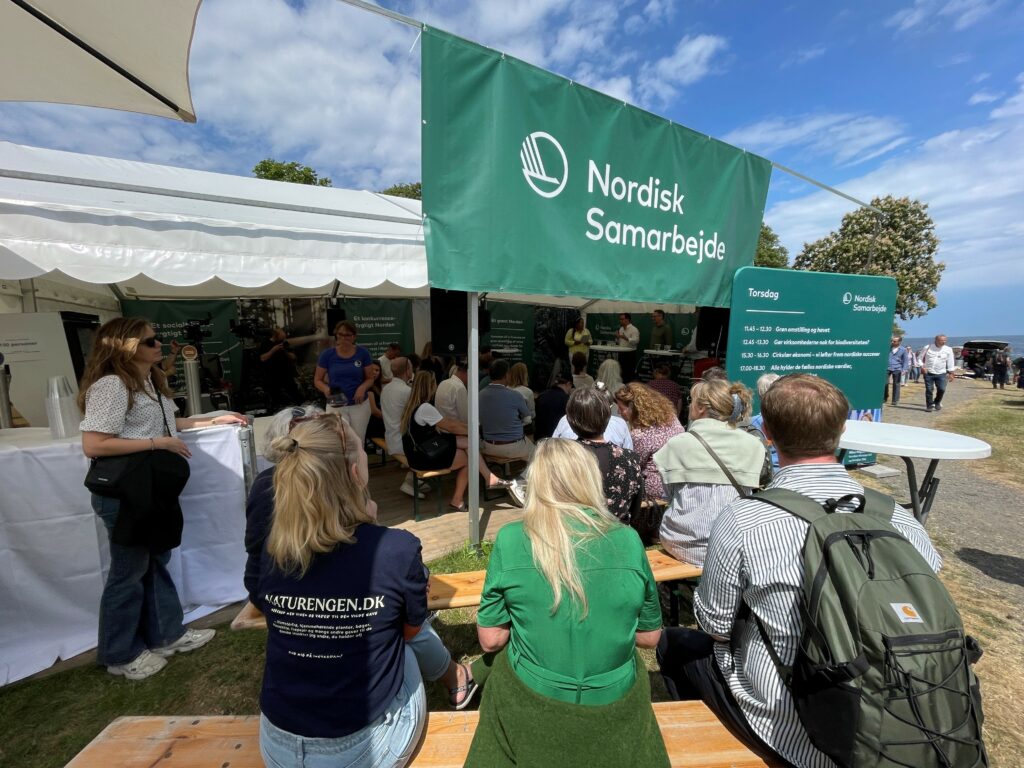16.06.2023 | Event
The young generation has a clear will and understanding of the need to speak up for more regenerative developments, and the need to do that locally,” said Marcus Taulborg, student and representative from the Nordic Youth Biodiversity Network, on 15 June during a debate on biodiversity and whether businesses are doing enough to protect the underpinnings of our existence.
Taulborg envisions a future where nature is no longer seen as a free resource for exploitation, but rather something that incurs cost, in one form or another.
The debate spotlighted the ways corporations can bolster biodiversity through nature-positive practices, the role financial institutions can play in redirecting capital flows towards nature-positive investments, and how ordinary citizens can spark dialogue with businesses about biodiversity.
This debate, organised jointly with the Nordic Investment Bank, the Nordic Council and the Nordic Council of Ministers, was held at Folkemødet, known as the People’s Meeting, in the scenic town of Allinge on Denmark’s island of Bornholm. The ethos of Folkemødet is to offer a platform for individuals and politicians to gather and deliberate on current political matters.
Urgent call to action
With biodiversity loss on the rise, urgent action is needed to reverse this dangerous trend and restore our ecosystems. A collective effort from all societal actors is crucial. Following the recent adoption of the new Global Biodiversity Framework, the private sector is also being called upon to play a significant role by endorsing and aiding in the restoration of biological diversity by 2030.
The panel, featuring speakers from various sectors including business, finance, and civil society, added depth to the discussion.
Søren Berg Rasmussen, Investment Manager at Nefco, shared his vision for an Earth without an Overshoot Day by 2040, marking the date when humanity’s resource consumption exceeds what the Earth can regenerate in that year.
“My vision is that we, as financiers, help make it possible for companies to better consider the use and reuse of resources, so that we are not using more than the Earth can sustain,” said Rasmussen, optimistically adding, “I actually believe we can succeed in that.”
Kim Skov Jensen, Chief Financial Officer, Head of Treasury & Finance at Nordic Investment Bank, envisages the entire financial sector playing a part in regenerating our already depleted nature and biodiversity.
“Banking are no longer only about deposits and lending. Like companies, banks need to consider that their activities are balanced towards nature, society, environmental aspects, and real actions,” Skov Jensen said.
Mette Dalsgaard, Business Development Director at COWI, an engineering and architecture consultancy, underscored that there is still time for companies to commence regenerating biodiversity, but that rapid action is necessary.
“It is very important and profitable for companies to include biodiversity in their business models. If they don’t react now, they may not have functioning business models as early as ten years from now,” said Dalsgaard, referencing a report from CONCITO, a Danish environmental think tank, which states that only 2.3% of Denmark’s land area is currently protected.
In contrast, the EU has made a commitment to biodiversity, promising that 30% of Europe’s land area should be protected, in line with the Kunming-Montreal Global Biodiversity Framework adopted at COP15 in December 2022.
Watch event recording
The recording of the event is available on YouTube

For more information, please contact:
